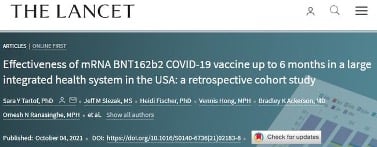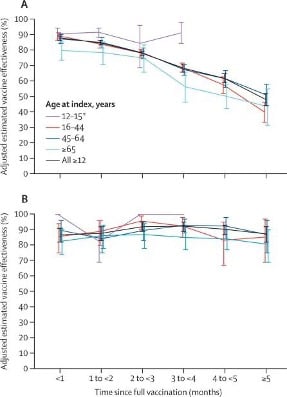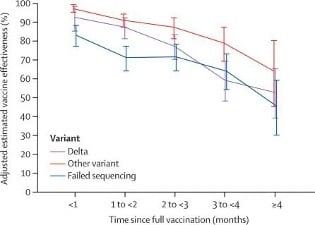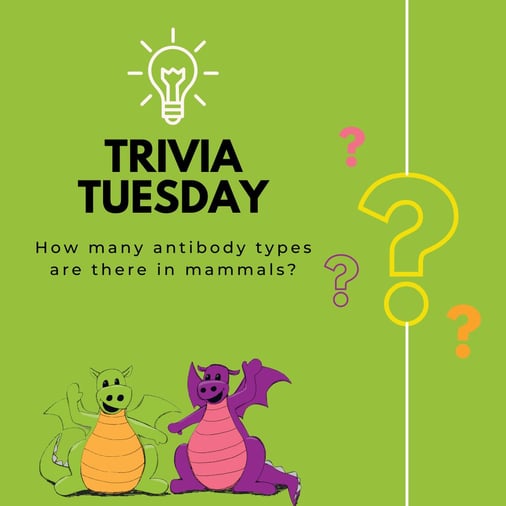Since the delta variant of the novel coronavirus has spread in the United States, more and more breakthrough cases (still infected after vaccination) caught people's attention, and a concern that the protective effect of the new mRNA vaccine is getting weaker arose. To address this question, we must determine whether these breakthrough infections were driven by the delta mutant strain, or were they due to the decline of immunity per se?
Accordingly, a fascinating retrospective study was conducted to assess the long-term effectiveness of the Pfizer mRNA vaccine (BNT162b2) after vaccination and its significance in response to different variants. In brief, data obtained from more than 3.43 million people in the United States were analyzed. They showed that six months after the two doses of Pfizer vaccination, the effectiveness of preventing hospitalization was still very high (~ 90%), while the efficacy of preventing infection was reduced significantly. Of note, the decline of the vaccine efficacy in preventing infection of the Delta mutant strain is mainly due to the weakening of the immunity itself rather than the immune escape. These findings suggest that vaccination is crucial for pandemic prevention and control, and long-term monitoring of the vaccine's effectiveness is still critical to provide a reference for public health management. These data were published in the top medical journal "The Lancet" (ONLINE FIRST), providing insightful evidence for vaccination strategies and future vaccine optimization design. Here is the summary.

- The overall effectiveness of vaccination
During the entire study period, fully vaccinated people with the BNT162b2 vaccine showed 73% overall protection from infections and 90% prevention from COVID-19 hospitalization. With the increase of age, the effect of preventing infection is declined. However, the impact of avoiding hospitalization is high among people of all ages.
People aged 12-15 years: prevent 91% of infections and 81% of being hospitalized.
People aged 16-44 years: prevent 73% of infections and 92% of hospitalizations.
People aged 46-64 years: prevent 73% of infections and 91% of hospitalizations.
People aged 65 and above: prevent 61% of infections and 86% of hospitalizations.

- The effectiveness of vaccination over time
Vaccine effectiveness against infection for the fully vaccinated decreased with increasing time since vaccination, declining from 88% in the first month to 47% after five months. While for the vaccine effectiveness in preventing hospitalizations for COVID-19, it is worth noting the steady high level along the time course. In detail, the overall efficacy of preventing COVID-19 hospitalization was 87% in the first month after complete vaccination and 88% at five months after full immunization.

- The performance of the BNT162b2 vaccine against different mutant strains
During the study period, for the fully vaccinated individuals, the overall vaccine effectiveness preventing the infection of the Delta mutant strain and other mutant strains was 75% and 91%, respectively. The highest efficacy of the vaccine against infection by the Delta variant and other variants was shown within the first month after being fully vaccinated (at 93% and 97%, respectively). After that, the vaccine effectiveness dropped to 53% against Delta infection and 67% for other variant strains after four months since being fully vaccinated.
The encouraging results are the overall effectiveness of preventing hospitalization. For all age groups, the BNT162b2 vaccine can prevent hospitalization caused by the Delta variant or other variant strains as high as 93% and 95%, respectively, for up to 6 months after complete vaccination.
Outcomes from this study pointed out the importance of continuously monitoring the long-term effects of vaccines on a global scale. However, the arrival of autumn and winter will make many seasonal respiratory diseases mixed with COVID-19 affect our life. To control the pandemic efficiently, it is critical to distinguish COVID-19 from other respiratory disorders promptly. Undoubtedly, the high-quality in vitro diagnostic reagents, including monoclonal antibodies to detect the SARS-CoV-2 virus, will play a vital role in this regard.

Click "Read more" to visit the official website of The Lancet to read the full paper.
